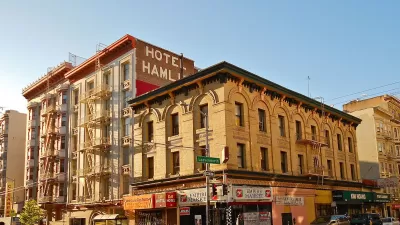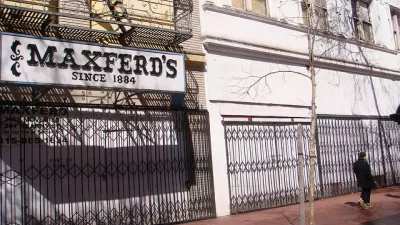With COVID-19 assistance programs expiring, tenants of the city’s single-room occupancy hotels face growing eviction rates. Many of them have nowhere to go but back on the street.

Residents of San Francisco’s single-room occupancy hotels (SROs), many of whom depend on the city-funded housing to stay out of homelessness, are getting evicted at higher rates as pandemic-era assistance programs lapse, report Joaquin Palomino and Trisha Thadani of the San Francisco Chronicle. According to the article, at least 114 people were evicted in the last fiscal year, compared to 40 in the previous years. “The Chronicle found that more than half of all evictions were in nine residential hotels, which housed 16% of all supportive housing SRO residents.”
The authors point out that these numbers belie the true extent of the city’s housing crisis, and that many tenants are forced out through unofficial means not recorded by HSH. “For example, some residents sign agreements with property managers, promising to leave by a certain date in order to keep the eviction off the books and preserve their housing record.”
The authors note that “The nonprofits that contract with the Department of Homelessness and Supportive Housing (HSH) to manage SROs typically kick out residents for the same issues that qualified them for the supportive housing programs in the first place: poverty, mental illness, trauma or an inability to care for themselves.” The Chronicle’s investigation found that these residents rarely receive any support in finding new housing.

Planetizen Federal Action Tracker
A weekly monitor of how Trump’s orders and actions are impacting planners and planning in America.

Maui's Vacation Rental Debate Turns Ugly
Verbal attacks, misinformation campaigns and fistfights plague a high-stakes debate to convert thousands of vacation rentals into long-term housing.

Restaurant Patios Were a Pandemic Win — Why Were They so Hard to Keep?
Social distancing requirements and changes in travel patterns prompted cities to pilot new uses for street and sidewalk space. Then it got complicated.

In California Battle of Housing vs. Environment, Housing Just Won
A new state law significantly limits the power of CEQA, an environmental review law that served as a powerful tool for blocking new development.

Boulder Eliminates Parking Minimums Citywide
Officials estimate the cost of building a single underground parking space at up to $100,000.

Orange County, Florida Adopts Largest US “Sprawl Repair” Code
The ‘Orange Code’ seeks to rectify decades of sprawl-inducing, car-oriented development.
Urban Design for Planners 1: Software Tools
This six-course series explores essential urban design concepts using open source software and equips planners with the tools they need to participate fully in the urban design process.
Planning for Universal Design
Learn the tools for implementing Universal Design in planning regulations.
Heyer Gruel & Associates PA
JM Goldson LLC
Custer County Colorado
City of Camden Redevelopment Agency
City of Astoria
Transportation Research & Education Center (TREC) at Portland State University
Jefferson Parish Government
Camden Redevelopment Agency
City of Claremont





























